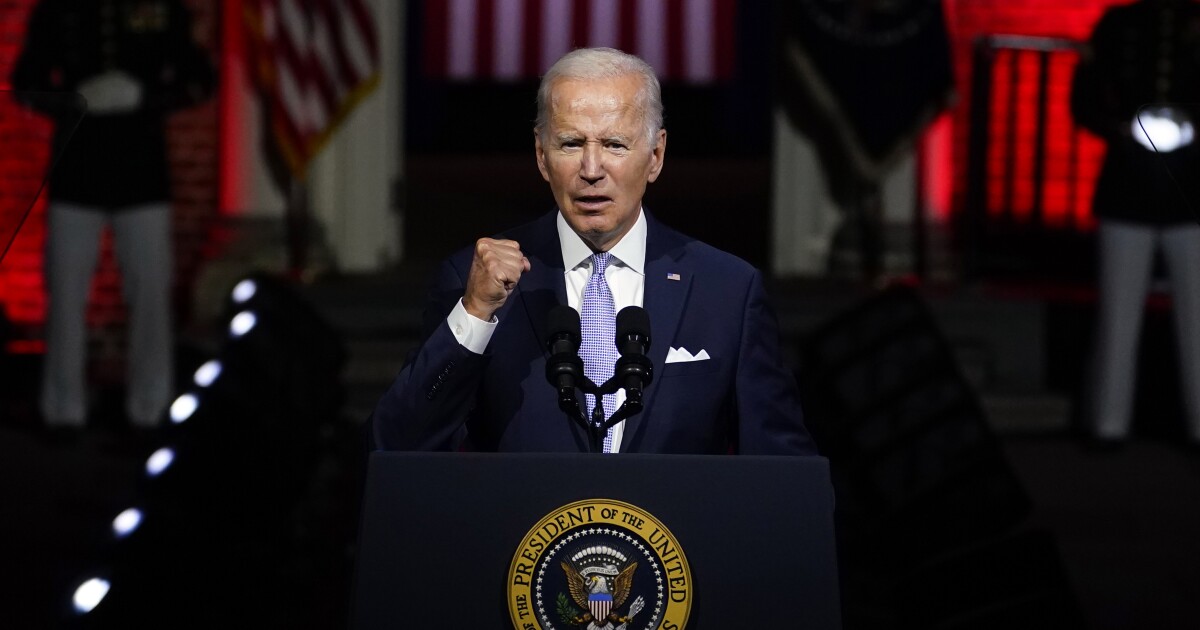

President Joe Biden has spent the last few weeks making dire warnings about threats to democracy and the horrors of Jan. 6, but has been notably silent on a bill making its way through Congress that could help secure election integrity going forward.
During Biden’s speech in Philadelphia last week, he spoke about ”
MAGA Republicans ” who might see the Capitol riot as a dress rehearsal for a larger effort after the next election.
WHITE HOUSE PRESS SECRETARY REJECTS COMPARING HER ELECTION SKEPTICISM TO TRUMP’S
“They look at the mob that stormed the United States Capitol on Jan. 6, brutally attacking law enforcement, not as insurrectionists who placed a dagger to the throat of our democracy, but they look at them as patriots,” Biden said. “And they see their MAGA failure to stop a peaceful transfer of power after the 2020 election as preparation for the 2022 and 2024 elections.”
The extremists tried everything last time to nullify the votes of 81 million people, Biden continued, adding, “This time, they’re determined to succeed in thwarting the will of the people.”
But Biden didn’t mention that the mob and its activities have also helped spur action in the Senate aimed at making such an effort more difficult to repeat.
A bipartisan group of senators introduced the Electoral Count Reform and Presidential Transition Improvement Act in August. Its sponsors included nine Republicans, who have since been joined by Sen. Chuck Grassley (R-IA)
, giving the bill potentially filibuster-proof GOP support.
The legislation
, led by centrist Sens. Susan Collins (R-ME) and Joe Manchin (D-WV), is aimed at reforming the Electoral Count Act of 1887 by clarifying “ambiguous provisions” on the vice president’s role in overseeing the process of certifying an election. Then-President Donald Trump and his allies used that ambiguity to pressure Vice President Mike Pence to reject certain states’ electors in a bid to overturn the 2020 election, which eventually led to the Jan. 6 Capitol riot.
The reform would also raise the threshold for objecting to certification from a single representative and a single senator to 20% of the members of both chambers. While 2020 is most notable, such objections have been raised in four of the last six presidential elections.
“Nothing is more essential to the survival of a democracy than the orderly transfer of power,” Collins, one of the bill’s sponsors, said during a committee hearing. “And there is nothing more essential to the orderly transfer of power than clear rules for affecting it.”
A wide coalition of groups has come out in support, including the Bipartisan Policy Center, the Project on Government Oversight, and the Center for American Progress.
Yet the White House
, which has made threats to democracy a pillar of its midterm messaging
, has not mentioned the Electoral Count Act since Feb. 7, which was the last time a reporter asked about the legislation by name during a press briefing.
Last Friday, following Biden’s controversial Philadelphia remarks
, a reporter asked White House press secretary Karine Jean-Pierre if voters can expect “any sort of policy rollout” underlying the speech to “actually address the threat to democracy.”
“What the president was trying to do at this moment, and we’ve seen this before, is give Americans a choice,” her answer began. “How do we move forward in this time, in this inflection point?”
Jean-Pierre’s response did not mention any specific policies the Biden administration wants to see implemented. The White House did not respond to questions from the Washington Examiner about whether or not Biden supports Electoral Count Act reform.
The reason for this discrepancy may come down to politics, argues Honest Elections Project Executive Director Jason Snead.
“There has been an unfortunate trend in this administration, and really across the Left as a whole, to play politics with the rules of our democracy,” Snead said. “Unfortunately, I think the desire to demonize their political opponents and literally make democracy a partisan issue makes them perhaps reluctant to talk about a bill like this, which has bipartisan support.”
Snead pointed to another Biden statement, which occurred during a January speech in Atlanta in which Biden compared opponents of Democratic-sponsored voting bills to Jefferson Davis and Bull Connor
, as another example of how the president has politicized election integrity.
White House officials at the time said Electoral Count Act reform should not be used as a substitute for the voting bills they were promoting, which conservatives blasted as a federal takeover of elections and ultimately went nowhere in Congress.
Some progressives make the same claim today, while others, such as the Center for American Progress, say Electoral Count Act reform is “potentially historic” and that members of Congress should “resist the temptation to make the perfect the enemy of the good.”
Collins pointed out that some calls to reject election results have come from Democrats, with House members objecting to the certification of Electoral College wins by Trump and George W. Bush.
CLICK HERE TO READ MORE FROM THE WASHINGTON EXAMINER
The Biden administration has also faced questions about its willingness to accept Democratic election losses. Jean-Pierre was pressed Monday on her history of undermining faith in democracy, having said on Twitter that the 2016 presidential election and 2018 Georgia governor’s race were each stolen
.
“It’s important for both sides to accept that they can lose an election,” said Snead. “That’s obviously a first step. The way you get there is to deliver fair elections based on clear rules.”






